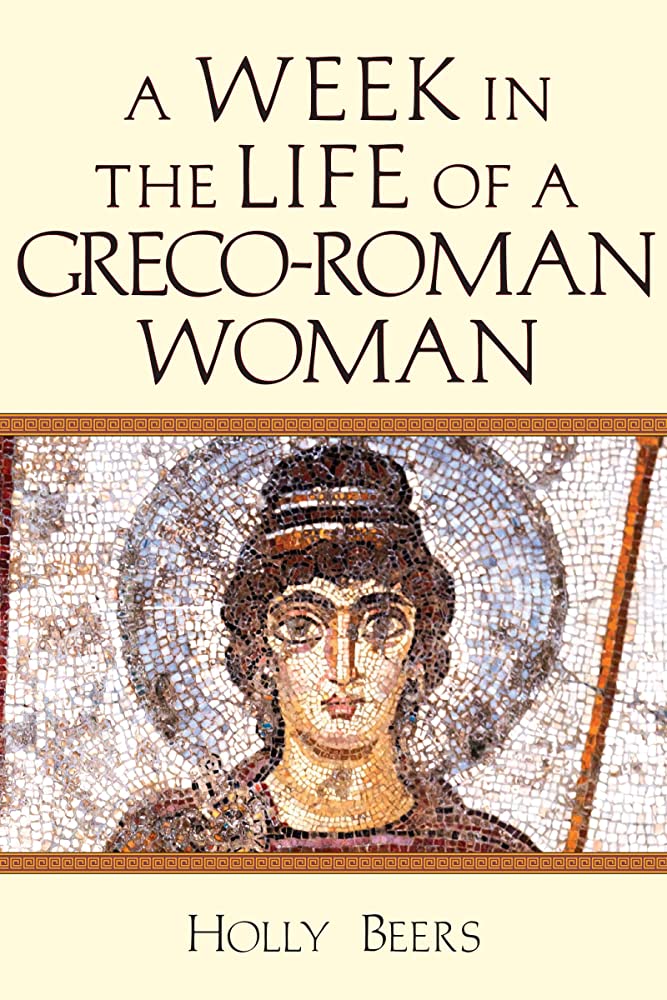Since my son Matthias started his first year at Biola University he’s been reading lots of books about the Bible and theology for his Biblical Studies minor. I decided to read along with him to catch up on current books since it’s been a while since I was in seminary. I wanted to see what books have come out and to be able to discuss his reading with him. Every Friday we have a call to discuss the Bible, life, what he’s reading and whatever comes up. It’s honestly my favorite part of the week.
Why I read A Week in the Life of a Greco-Roman Woman
This semester Matthias had two required books for his New Testament Survey from the A Week in the Life series published by Intervarsity Press. These are fictional stories that give insights to first century life. Being men, we both opted to read A Week in the Life of a Roman Centurion first. After all, it is about a Roman warrior! I really like how the Week in the Life books are written as novels. They follow a main character and their story, allowing the reader to live in the first century world and learn about important historical and background issues.
Knowing background issues helps a twenty first century person understand the Bible more clearly. Along the way there’s one page background excerpts explaining interesting things like how ancient people brushed their teeth, or bathed, or what utensils they used to prepare and eat their meals. Expert scholars write in this series so the research is world class and reliable. And, best of all, they’re short! They’re only about 200 pages and fun to read!
I love historical and background research about the Bible—to understand the Bible well, the first thing we have to know is it’s an ancient book written to someone else that lived somewhere else. We’re often so desperate to prove how relevant the Bible is, we try to read it like it was written in English to twenty-first century Americans. But when we read that way, we often miss what the text is saying. These little books are helpful, and I really enjoyed the story and the learnings from A Week in the Life of a Roman Centurion. With similar curiosity I began reading A Week in the Life of Greco-Roman Woman.
Thoughts on the Book
Without spoiling anything, the book grabbed my attention in the opening scene where Anthia, the main character, aids her friend giving birth and everything goes wrong. We learn quickly that Anthia is also pregnant—and bleeding. Anthia’s anxiety about the baby in her womb connected me to the earthy realities of the first century world while also giving a real-life example of a person’s developing faith in Jesus.
What I liked about A Week in the Life of Greco-Roman Woman. First, the author, Dr. Holly Beers, is a top class, female, New Testament scholar. Dr. Beers clearly knows her way around the first century and the teaching of the New Testament. Frankly, the book addresses realities for women I don’t think a male writer would consider without consulting with a woman. This strength raised my awareness of what life was like for women in the first century, but even today in many respects. She does an excellent job of showing disparities and differences between men and women and how social class added complexity to those relationships. For examples, we see how men of a lower class treats his wife as a possession but defers to a woman of a higher class.
Dr. Beers clearly understands Paul, his theology, and his mission as well. I’ll share more on this below, but she shows Paul in context and enables the reader to listen in on what his preaching would have sounded like. She shows Paul in action so the reader can experience how Paul might have interreacted with people in his ministry. This is helpful given the nature of the Bible’s sparing narrative style.
How it Challenged my Faith
Second, I was challenged in my own faith—I can’t stop thinking about this book. Sometimes seeing your beliefs through a different lens can reframe your understanding of the Bible and what it says. I’ve traveled to El Salvador, India and Thailand on ministry trips and always come away having learned from my brothers and sisters in other countries. Seeing Jesus through another cultural lens brings our hidden assumptions about who he is and what the world is like. Dr. Beers enables the reader to see Jesus through the lens of first century Greek people—when the message about Jesus was spreading for the first time in history.
Followers of the Way (not the Mandalorian!)
In the story followers of Jesus identify themselves as followers of the Way and as followers of Jesus rather than as Christians. These terms are found clearly in the book of Acts, so it’s not an innovation. But it’s a reminder the first followers of Jesus self-identified differently than modern Christians. The word Evangelical and even Christian today increasingly have connotations with which I am uncomfortable. Indeed, the words are terms associated with power and control that undercuts the message of power in weakness through the cross of Christ. In the story, no one in Ephesus knows who this Jewish man Jesus is. They’ve never heard of the Way. It allows the Apostle Paul, Priscilla and Aquilla and others to show what this faith is rather having to combat many preconceived ideas. We live over two thousand years since these events when Christianity is the world’s largest religion. It may be tough to find a label disassociated with so much history, good and bad. Still, I want to find ways to identify my faith with the person of Jesus more and with people’s political agendas less going forward. I am a follower of the Way.
Preaching the Resurrection
The depiction of Paul’s preaching and ministry was another highlight. Walking along the streets of Ephesus Anthia hears Paul preaching about this Jewish man, who he claims is a god! This is strange to a Greco-Roman who looks to Artemis and Asclepius for healing and protection. Anthia cannot get out of her head Paul’s teaching about this philosophy with its focus on future bodily resurrection. She knows all about the soul going to heaven when she dies—that’s what the priests of the pagan gods teach. But Paul preaches something different. He preaches a message about followers of Jesus being raised back to life bodily one day. And in fact, this Jesus person has supposedly already been raised from the dead as a testimony of his followers’ future resurrection!
The Resurrection through Anthia’s Ears
Hearing the teaching of the resurrection through Anthia’s ears reframed how I want to share the gospel. How many youth retreats, children’s camps and evangelistic services have I attended where the message is about ‘accepting Jesus into your heart’ (not a biblical concept!) to fix into your loneliness and depression (not a biblical concept!) so you can go to heaven instead of hell (not a biblical concept!)? We sing songs about how “this world is not my home I’m just a passin’ through,” and long to escape our ‘sinful bodies’ so our souls can go to heaven. And this message from people—pastors!—who profess the Bible as their authority for faith and life. This is great teaching for a follower of Plato. This is fine if you’re a Gnostic or worship the pagan gods of Greece and Rome. But the Biblical hope is physical resurrection to life in a resurrected world where heaven comes down to earth and we live with God!
I found myself wondering if we are—if I am—bold enough to preach the resurrection? I find we tend to spiritualize literal truth in the Bible because we’ve never (rarely?) seen someone raised from the dead or healed without medical intervention. As people raised in the scientific age, even people of faith are skeptical about God’s working in the world—I know I can be. And this is why hearing Paul’s preaching of the resurrection through Anthia’s ears caught me so off guard. I wonder what would happen if we were bold enough to preach the resurrection?
A Form of Godliness without its Power?
And this point about healing brings me to another area where I was challenged. Two people are healed by Paul the story. I won’t say who (no plot spoilers!). Paul’s healings confuse people in Ephesus. Looking through Anthia’s eyes, I felt her anxiety about what Artemis would do to her if she found out Anthia was around these followers of Jesus while they heal people. At one point Paul says, “You don’t need to pay anything. Jesus doesn’t want anything from you. Jesus is a God who heals. That’s who he is.” I don’t know about you, but I do not have the faith, the confidence, to say those words to someone so bluntly. Am I so committed to taming God—fitting Him into some theological system—that I am missing out on His power? I haven’t settled this question yet and it’s one of the reasons I’m writing this review. May I read more books that challenge my faith in Jesus!
Jesus’ New Humanity, Women and Men
The third category where this book challenged me is in my view of women. Apparently, I need to time travel two thousand years to the other side of the globe to see things right in front of me. Anthia thinks of her husband, Philetus, as a good man. She spends the whole novel trying to keep her bleeding and fears about the pregnancy from her husband. When he strikes her for breaking a bowl, I got a sense of why. Typical of men in that society, her husband visits prostitutes occasionally. Anthia is careful to make sure Philetus doesn’t see her when she sees him coming out of the brothel. Philetus is a fisherman who works hard to provide for his family. It’s extremely hard work, they wonder where food will come from most days, and he wears his strain for the family on his whole body. But for good reason, Anthia fears Philetus. When he finds her talking with women he doesn’t approve of, he hits her and drags her away by the hair. She knows she will be blamed if she loses the baby (This was so common in the ancient world they did not name children until they were three years old. Anthia knows the likelihood of dying in childbirth is high).
Are We Any Different?
In contrast, Anthia cannot believe the difference between her marriage and that of the Jesus’ followers. Husbands and wives treat each other as equals with mutual respect. They serve one another rather than lord authority over one another. I found myself wondering on this topic if the Church today is once again more pagan than Jesus-oriented on this topic. Men who lord authority over their wives like Philetus are certainly more common in Churchianity today than it ought to be. Even worse, it’s too often condoned by church leaders and well-known voices. I fear too few Christian men might read this book, but for those who do, I think it will challenge long-held beliefs about the biblical nature of men, women, marriage, and Christian community.
Still, I finished the book wondering how many Christian women today feel more like Anthia than we realize. Quietly afraid of their ‘Christian’ husband and what he’ll do to her if he finds out about X. I had the privilege to live inside Anthia’s head for a week—hearing and feeling her concerns. How will she clothe Nikias their son? How can she get her aging faither-in-law’s clothes cleaned after he had diarrhea—and in a way that Philetus won’t get mad at her wasting money or time? She worries about her friends and her family. Life was harsh then and many things we take for granted today were a serous chore for ancient people. But I know my wife worries about our boys, her sisters who are dear to her, our finances and more. Men don’t have to think about all the things connected with being the gender who bears children. I’m thankful Dr. Beers included those real-life details about the day to day. I think women even today think about related issues much more than we men understand.
Read this Book!
A Week in the Life of Greco-Roman Woman is a fun adventure into another time and place and provides an extremely accessible way to walk around the streets of Ephesus during Paul’s day. It will benefit anyone’s understanding of the book of Acts and Paul’s letters. Beyond that, I was challenged about how to think of my faith in Jesus—how to share our future hope of the resurrection and God’s power to heal. The depiction of pagan marriage contrasted with marriages among followers of the Way sheds light about the state of Christian marriages today if we’re willing to go there. Most men look at following Jesus though a male lens and I’m no different. I realized I look at the world and my faith through a male lens. In the book, To Kill A Mockingbird by Harper Lee, Atticus Finch says,
“You never really understand a person until you consider things from his point of view – until you climb into his skin and walk around in it.”
A Week in the Life of a Greco-Roman Woman gave me an opportunity to do just that. I already loaned my copy to a friend, and I would highly recommend this book to anyone who’s prepared to see your faith and the world a little differently.






